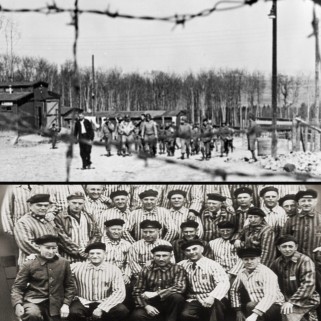Admin I Saturday, Jan. 27, 2027
LAGOS Nigerian- The world commemorates the 97th International Holocaust Remembrance Day (also known as World Holocaust Day or IHRD) on January 27 this year, it is a time to reflect on the inhumane treatment meted out to groups seen as opposed to the Nazi regime and the world’s response to genocide since the end of World War 2.
One of the groups targeted by the Nazi regime was Jehovah’s Witnesses who were among the first to be sent to the Death Camp.
For many, the observance of the liberation from Auschwitz-Birkenau Concentration Camp which forms the basis for the World Holocaust Day commemoration on January 27 is a sobering reminder of the atrocities of which man is capable against his fellow man.
To this end, the World Holocaust Day has been commemorating victims of the holocaust and promoting and preserving the educational and historical significance of that sad aspect of world history.
During its nearly five years of operation, Auschwitz expanded to include a concentration camp, a forced-labor camp, and an extermination camp, as well as over 40 subcamps.
Here, the Nazi regime carried out some of the most agonizing human rights abuses against millions of Jews, as well as Poles, Slavs, Roman and Sinti, homosexuals, and people with disabilities, among others. Some 400 Jehovah’s Witnesses of various nationalities, including Polish and German, were also among those victimized at the infamous camp. Four gas chambers claimed as many as 6,000 prisoners lives daily.
A purple-triangle patch stitched near the prisoner number on the left side of uniforms identified Jehovah’s Witnesses who were imprisoned, not for their national or ethnic identity, but for their religious beliefs.
On Saturday, Jan. 27, 1945, the Soviet Union’s Red Army liberated some 7,000 prisoners from the death complex.
“The Witnesses’ moral principles and practices did not align with the Nazi ideology of racism, hate, and extreme nationalism. Because of this, the activity of Jehovah’s Witnesses was targeted by the Nazi Government, and they were banned throughout Germany as early as 1933,” said Joseph Fajuke, a local spokesperson for Jehovah’s Witnesses.
He adds: “How the Witnesses held on to their faith as they faced the daily cruelties of Auschwitz is a little-known part of Nazi-era history. Anyone with a strong conviction will find their story compelling.”
“On the scale of Auschwitz’s huge community, the Jehovah’s Witnesses constituted but a tiny, inconspicuous little group,” said sociologist and Auschwitz survivor Anna Pawełczyńska. “Nevertheless, the colour of their triangular badge stood out so clearly in the camp that the small number does not reflect the actual strength of that group.
This little group of prisoners was a solid ideological force, and they won their battle against Nazism.”
Auschwitz-Birkenau State Museum records indicate that Jehovah’s Witnesses were among the first prisoners sent to the camp. Of the hundreds of Witnesses incarcerated at Auschwitz, at least 35 percent died there.
The museum’s website states: “Aside from brief mentions, the literature on the history of Auschwitz Concentration Camp does not take account of the Jehovah’s Witnesses (referred to in the camp records as Bible Students]) who were imprisoned because of their religious convictions. These prisoners deserve closer attention because of the way they managed to hold on to their moral principles under camp conditions.”
“They were persecuted solely on the basis of their religious convictions,” says, Olusegun Eroyemi, National spokesperson for Jehovah’s Witnesses in Nigeria. “The Nazis offered them freedom if they would renounce their Christian faith and support the regime. Yet, they had the courage to stick to Christian values—loyalty to God and love for others.”
This year, as conferences and exhibitions related to the 79th anniversary of the Auschwitz liberation take place around the world, Jehovah’s Witnesses have released a digital brochure titled: “Purple Triangles – “Forgotten Victims” of the Nazi Regime”. The 32-page brochure is available for free download on their official website, jw.org, and presents a selection of pictures and documents from a traveling exhibition curated by the Witnesses to educate the public about their persecution during the Holocaust. The 50 three-dimensional panels as contained in the brochure were exhibited at several memorial museums of former concentration camps and educational institutions throughout Europe.
About 600,000 visitors had viewed the exhibit by the end of 2002.
Additionally, the Ghetto Fighters’ House Museum, the first Holocaust Museum in the world, is currently featuring an interactive exhibition that highlights the Witnesses’ courageous stand in the face of Nazi Persecution.
The exhibition is titled “Wedontdothat,” inspired by the nickname given to Joachim Alfermann, one of Jehovah’s Witnesses persecuted by the Nazis. It is presented in Arabic, English, and Hebrew and will be on display until September 2024 at the museum’s Center for Humanistic Education in Western Galilee, Israel.
To view the free and downloadable brochure, visit jw.org > Library > Books & Brochures > Purple Triangles – “Forgotten Victims” of the Nazi Regime.
“Jehovah’s Witnesses were the only Christian group under the Third Reich to be marked by a separate prisoner symbol—the purple triangle“ – Professor Detlef Garbe, former director of the Neuengamme Concentration Camp Memorial.
Fast facts:
*Of the approximately 35,000 Witnesses in occupied Europe, about 13,400 were victims of Nazi persecution.
*About 11,300 were arrested.
*About 4,200 were sent to concentration camps.
*More than 1,250 victims of Nazi persecution of Jehovah’s Witnesses were minors.
*Around 600 children of Jehovah’s Witnesses were abducted by the Nazi government.
* At least 72 Jehovah’s Witnesses were killed by euthanasia.
*At least 548 Witnesses―some of them minors―died by execution or deliberate homicide.
* An estimated 6,000 Witnesses were detained in prisons or concentration camps during the time of the Holocaust.
*In total, about 1,600 Witnesses lost their lives because of Nazi persecution.
